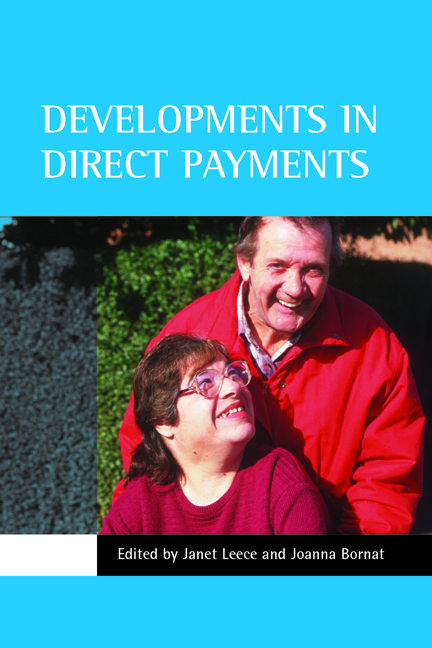Book contents
sixteen - Can intensive support widen access to direct payments?
Published online by Cambridge University Press: 18 January 2022
Summary
The 1996 Community Care (Direct Payments) Act enabled local authorities to make direct payments to disabled people as an alternative to receiving services, giving them choice and control over their support. From the beginning, concerns began to be expressed that certain groups of potential users would in effect be excluded from access to direct payments (see, for example, Ryan, 1998).
Department of Health (DH) annual returns reveal that these fears have been realised. Take-up of direct payments by older people, people with learning difficulties, and mental health service users has continued to be alarmingly low. For the purposes of this study, attention was focused on these three ‘marginalised’ groups, because they continue to have demonstrably low take-up, despite being eligible for direct payments since 1997 (in the case of people with learning difficulties and mental health service users), or since 2000 (in the case of older people).
Research appears to indicate that one of the factors in the low take-up was that some potential direct payments users feared the responsibilities and were unclear whether and how they would receive ongoing support with these (Gramlich et al, 2002; Clark et al, 2004; Spandler and Vick, 2004). A range of proposals have aimed to address these issues. These include the promotion of direct payments in accessible formats, the training of social services staff, and so on. There have also been a number of proposals on specific schemes for supporting individuals, such as, for example, independent living trusts, circles of support, and brokering schemes. In 2003 the Direct Payments Development Fund made funding available to Direct Payments Support Services (DPSSs) for the development of projects that would address the low take-up problems, some of which focused on intensive support schemes.
In the face of low take-up by some marginalised groups, DPSSs have been requesting better guidance on good practice and, in particular, the best ways to support people. Concern specifically focused on enabling people who face barriers to communication to get their voices heard in relation to direct payments; and providing ongoing support with management of direct payments to enable independent living.
Intensive support schemes
In response to these concerns, the National Centre for Independent Living (NCIL) decided to take a close look at the support models that had been proposed, and commissioned the study discussed in this chapter, which therefore looked at the following forms of support.
- Type
- Chapter
- Information
- Developments in Direct Payments , pp. 221 - 236Publisher: Bristol University PressPrint publication year: 2006



